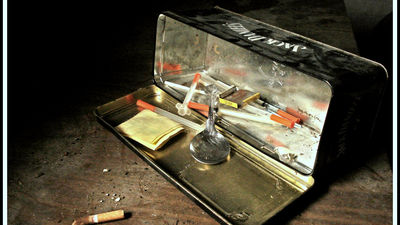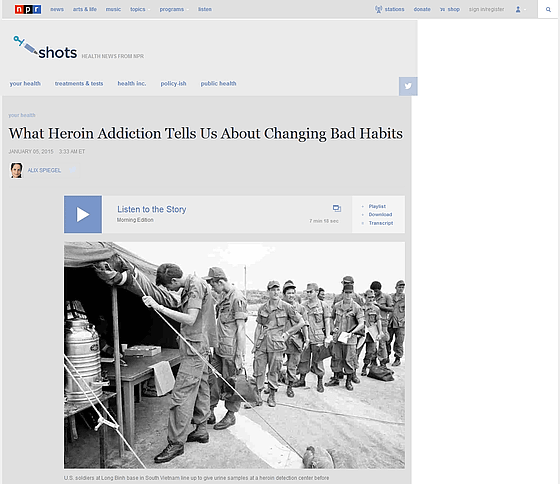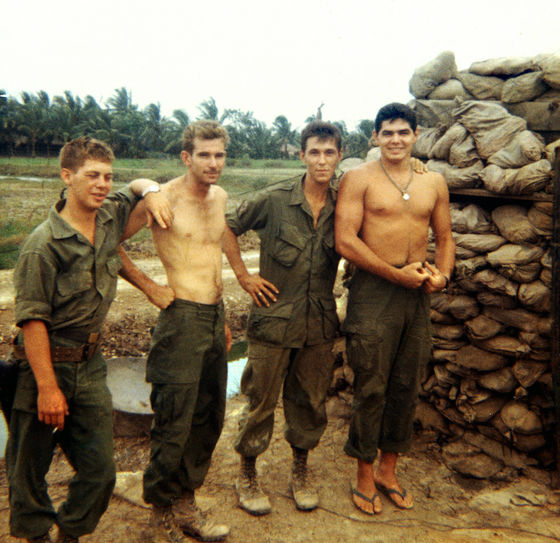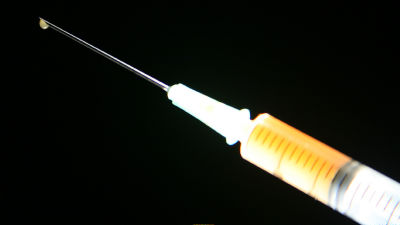Learn from heroin addiction treatment How to change bad habits

ByMatthew T Rader
It took place from 1960 to 1975Vietnam WarSo, 15% of Americans soldiersheroinIt was said that he was injured. The United States government, which saw the situation seriously, quickly set up a "Drug Abuse Prevention Countermeasure Bureau". Through the rehabilitation program carried out there, the heroin reuse rate of poisoned soldiers was kept to less than 5%, but a program that cuts on the addiction of heroin, which is said to be the most addictive among narcotics However, it is drawing attention in research on bad habits.
What Heroin Addiction Tells Us About Changing Bad Habits: Shots - Health News: NPR
http://www.npr.org/blogs/health/2015/01/05/371894919/what-heroin-addiction-tells-us-about-changing-bad-habits

Around May 1971, according to a report from an American parliamentarian visiting Vietnam officially, it was discovered that 15% of US soldiers are handling heroin. President Richard Nixon of that time seized the situation immediately, when he severely watched the situation of heroin which is a drug that is avoided even in the United States because of its addictive strength. In 1971, "Drug Abuse Prevention Countermeasure Bureau" was established and Mr. Jerome Jaffy, Director of Drug Affairs, was appointed as the responsible person. In order to promote research, Mr. Jaffe asked for assistance from psychiatric researcher Lee Robin.
Mr. Robin conducted a urine test against a soldier who is located in Vietnam, and found out that 20% of the soldiers were in a state of heroin poisoning. Soldiers who had been confirmed to be addicted were sent off and received a program such as rehabilitation, they stayed in Vietnam until the withdrawal symptoms disappeared and returned to the United States after the recovery. Mr. Robin investigated soldiers after returning home for a certain period, but only 5% handed out heroin again after returning home, 95% of addicts never handed out heroin after returning home was.
Since the heroin reuse rate of heroin poisoning patients in the United States was actually more than 90%, at that time "Mr. Robin is making some kind of mistake", or "It is a political influence giving a false report" To the extent received. However, this research has been drawing attention in the field of behavioralism just after 40 years.

ByBrian Ambrozy
According to Wendy Wood, a professor of psychology at the University of Southern California who is studying ways to change human behavior and habits, "When the same habits are repeated in the same setting and environment many times, that habit will change nicely You can do it. " For those who have a habit of driving a car everyday, "driving a car" is just a part of everyday, but the act of driving a car is "opening the door lock" "sitting on the seat to adjust the position" "ignition key Task "tasks accumulated. Professor Wood, there is room for change as these everyday movements are acquired afterwards unconsciously.
In order to cut off bad habits like smoking, Professor Wood says that it is important to consciously divide unconscious actions, for example, "smoke a cigarette with a hand opposite to the dominant hand" . The professor said about the unusually low heroin reuse rate of the soldiers of the Vietnam War, "The soldiers came home after receiving treatment for dependence in Vietnam who remembered heroin but not in the US After heroin's evil habit Moving to a drasticly different environment from the environment with the hereditary environment is considered to be a major factor preventing the recurrence of heroin, "Wood says.
Related Posts:







